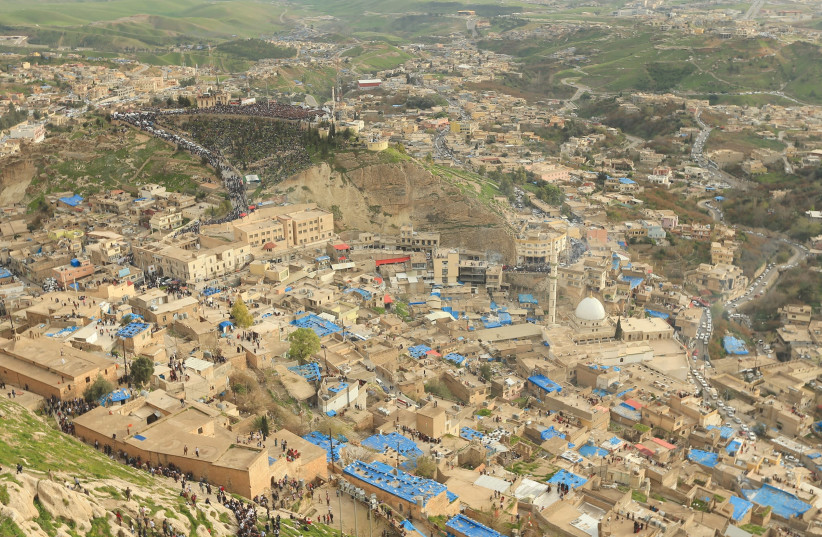The Kurdistan autonomous region welcomed Cardinal Louis Raphael Sako, patriarch of the Chaldean Catholic Church over the weekend. He had been forced to relocate to Erbil because Baghdad has sought to withdraw recognition of him. Kurdistan Region Prime Minister Masrour Barzani on Saturday welcomed the Christian leader.
“We warmly welcome Patriarch Louis Sako to Erbil, the capital of peaceful coexistence for all religions and groups,” said Barzani in a tweet. “The Kurdistan Region, and the alchemy of coexistence that thrives here, is a source of pride to us all,” Rudaw media report.
Iraq’s decisions to try to isolate the Christian leader and take away recognition of his position has raised concerns globally.
“We are disturbed by the harassment of Cardinal Sako…and troubled by the news that he has left Baghdad. We look forward to his safe return. The Iraqi Christian community is a vital part of Iraq’s identity and a central part of Iraq’s history of diversity and tolerance,” the US State Department spokesperson Matthew Miller said during a press briefing.
Iraq then slammed the US, claiming the US was wrong to critique Iraq. Iraq’s presidency claimed their office only cancelled a decree, which they claim they have a right to do. Iraq will now summon the US ambassador. Iraq is already in a crisis over attacks on Sweden’s embassy in Baghdad and attacks on a Danish charity in Basra. Iraqis are being encouraged by pro-Iran groups to attack Sweden due to attacks on the Quran in Sweden.

According to reports at Rudaw Rayan al-Kildani, “leader of the nominally Christian Babylon Movement, a party and militia affiliated with the pro-Iran Popular Mobilization Forces (PMF, or Hashd al-Shaabi in Arabic) and Iran’s Islamic Revolutionary Guard Corps (IRGC)” has been at the forefront of attacks on the Cardinal. Kildani is sanctioned by the US. Iraq’s President Abdul Latif Rashid cancelled a presidential decree that had recognized Cardinal Sako and gave him power over Christian endowments.
Sako has moved to the Kurdistan region for now because it is safe and secure and there are many Christians there. The Iraqi Christian community has been persecuted in the last two decades. The rise of extremism after the US invasion of 2023 caused many Christians to flee and then insurgents linked to Al Qaeda, ISIS and other groups committed ethnic cleansing against Christians. Many had to flee to safe areas such as Erbil. However, the community is also divided and Iran has tried to infiltrate and hijack some Christian groups to create more divisions.
“We are disturbed by the harassment of Cardinal Sako…and troubled by the news that he has left Baghdad. We look forward to his safe return. The Iraqi Christian community is a vital part of Iraq’s identity and a central part of Iraq’s history of diversity and tolerance.”
Matthew Miller, US State Department spokesman
The Iraqi presidency says it is merely cancelling a decree that was “illegal.” It argues that this does not affect Sako’s overall role because he was appointed as the head of the Chaldean Catholic Church in Iraq by the Vatican. But Sako has said the cancellation is a danger.
“It is unfortunate that we in Iraq live in the midst of a wide network of self-interest, narrow factionalism, and hypocrisy that has produced an unprecedented political, national, and moral chaos, which is rooted by now more and more,” Sako wrote, according to the Catholic News Agency. “Therefore, I have decided to withdraw from the patriarchal headquarters in Baghdad.”
A report at Al-Monitor noted that the dispute between Sako and Kaldani relate to questions about how the groups linked to Kaldani have exploited their role in Nineveh plains to seize property. The Vatican has appeared to be cautious in taking a larger role in this dispute.
Symbolic struggles
The overall dispute is symbolic of larger power struggles. Although the president of Iraq is Kurdish, he is not from the same Kurdish party that runs Erbil and which is more powerful in the Kurdistan autonomous region. According to reports it was under Jalal Talabani, then president of Iraq in 2013, that the decree recognizing Sako was published. Talabani was head of the PUK, but he has passed away.
The current Iraqi president is also linked to the PUK, but has made a different decision. The PUK is considered closet to Iran. The PMU, which Kaldani is part of is, is backed by Iran. Therefore this could be seen as a way for Iran to gain influence.
It is also part of the larger struggle to diminish and politisize Christian leaders in Iraq and also perhaps to use Christian lands in Nineveh to threaten the Kurdistan region and to bolster Iran’s role in the environs of Mosul. Important Christian communities, such as at Qaraqosh and Karamlesh matter in these context.
